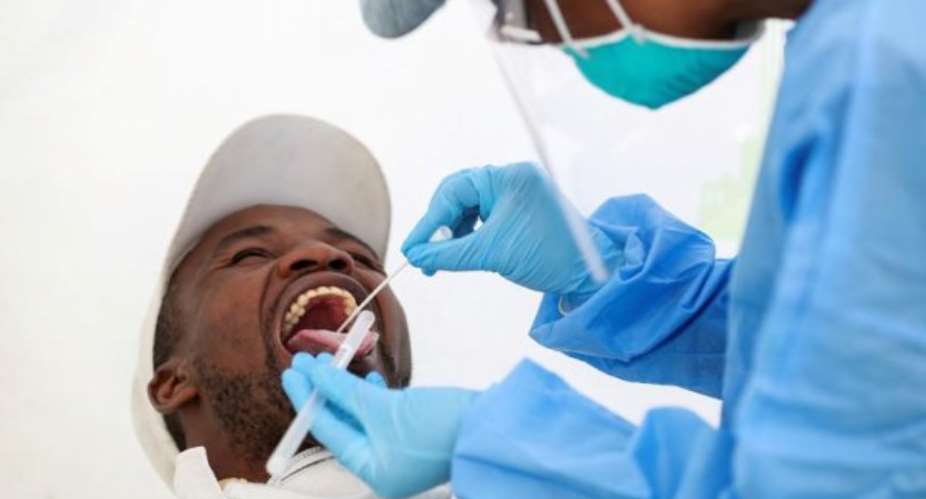Majority of Ghanaians have never tested for COVID-19 because of the fear of stigma around testing positive, a Ghana Statistical Service survey has shown.
The survey conducted in the first two weeks of December 2021 showed that only 21.6 per cent of Ghanaians had ever been tested for COVID-19.
Apart from the fear of stigma, some of the people interviewed cited the unavailability or distance to a testing facility for not getting tested for COVID-19.
The data was collected from a total of 7,999 households in the first two weeks of December 2021 across the country.
In a brief on the impact of the Covid-19 Households and Jobs Tracker Survey Report, Mr Victor Boateng Owusu, Senior Statistician and Project Coordinator said the survey revealed that COVID-19 was not a major reason for people not working, adding that only 4.3 per cent of the respondents gave COVID-19 as a reason for not working.
Touching on the nine indicators of the wellbeing of children between four and 17 years old, Mr Owusu said improvements were reported compared to the period before January 2021 when schools were reopened.
He said Children felt less distressed, less afraid and less sad but also less likely to experience physical punishment and less likely to work.
Mr Owusu said only 26.7 per cent of Ghanaians indicated that their total household income stayed the same as compared to the period before COVID-19, adding that 5.1 per cent of citizens indicated that their total income increased while 68.2 per cent indicated that their household income decreased.
“Of the different sources of income, non-farm family business income saw the biggest reduction. 77.3 per cent of households with income derived from a non-farm family business saw a decrease in income and only 4.4 per cent reported an increase in income,” it said.
He said 4.2 per cent of households, who got income from pension, saw the smallest change of this income source while 76.7 per cent reported no change in pension income, 13.0 per cent a reduction and 10.3 per cent an increase.
It said the median expenditure on Personal Protective Equipment (masks, sanitisers, face shields, etc.) per household on the seven days before the interviews was 12.0 Ghana cedis and the mean expenditure of 22.0 cedis, adding that the Median expenditure was slightly higher in urban areas (14 GH?) than in rural areas (10.3 GH?).
Approximately, 87 per cent of households used some sort of coping strategy such as relying on savings and reducing food consumption to deal with the negative effects of COVID-19 since March 2020.
It stated that 73.4 per cent indicated that an increase in prices was the most common shock experienced by households due to COVID-19 since March 2020.
“Rural households were less food secure than urban households and the coastal zone was more food secure on all indicators than the national average with the exception of the percentage of households that indicated they ran out of food,” Mr Owusu said.
GNA





 Minority will expose the beneficial owners of SML, recover funds paid to company...
Minority will expose the beneficial owners of SML, recover funds paid to company...
 Prof. Opoku-Agyemang has ‘decapitated’ the NPP’s strategies; don’t take them ser...
Prof. Opoku-Agyemang has ‘decapitated’ the NPP’s strategies; don’t take them ser...
 Abubakar Tahiru: Ghanaian environmental activist sets world record by hugging 1,...
Abubakar Tahiru: Ghanaian environmental activist sets world record by hugging 1,...
 Prof. Naana Opoku-Agyemang will serve you with dignity, courage, and integrity a...
Prof. Naana Opoku-Agyemang will serve you with dignity, courage, and integrity a...
 Rectify salary anomalies to reduce tension and possible strike action in public ...
Rectify salary anomalies to reduce tension and possible strike action in public ...
 Stop all projects and fix ‘dumsor’ — Professor Charles Marfo to Akufo-Addo
Stop all projects and fix ‘dumsor’ — Professor Charles Marfo to Akufo-Addo
 Blue and white painted schools will attract dirt shortly – Kofi Asare
Blue and white painted schools will attract dirt shortly – Kofi Asare
 I endorse cost-sharing for free SHS, we should prioritise to know who can pay - ...
I endorse cost-sharing for free SHS, we should prioritise to know who can pay - ...
 See the four arsonists who petrol-bombed Labone-based CMG
See the four arsonists who petrol-bombed Labone-based CMG
 Mahama coming back because Akufo-Addo has failed, he hasn't performed more than ...
Mahama coming back because Akufo-Addo has failed, he hasn't performed more than ...
